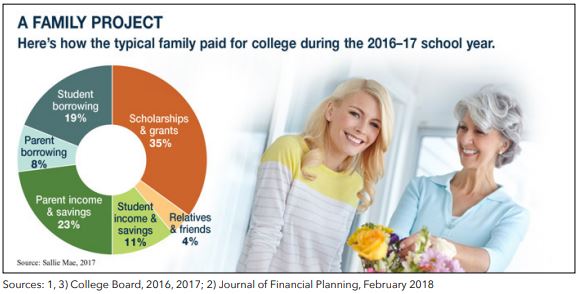Investor Education | Help with College: A Gift for Your Grandkids
College graduates generally earn more, have lower rates of unemployment, lead healthier lifestyles, and are more active citizens than those without a degree. One estimate places the lifetime value of a bachelor’s degree at $2.8 million.
That kind of opportunity requires a substantial investment that can be overwhelming even for families who are on solid financial ground. For the 2017–18 academic year, the average annual cost for tuition, fees, room, and board was $20,770 at a four-year public university and $46,950 at a nonprofit private university.
Helping a grandchild obtain a college degree could be life-changing for the student and bring joy to you as well. However, to maximize the gift, it’s important to consider the potential ramifications for student aid and taxes.
Consider the FAFSA
The Free Application for Federal Student Aid (FAFSA) is the standard application for needbased student aid. Some schools also require additional, more detailed applications. A direct gift to your student would be included under the student’s income and savings on the FAFSA and may have an outsized effect on aid.
Depending on the size of your gift and the student’s other sources of funding, you might consider waiting until his or her senior year of college, after all financial aid has been finalized. Or you could wait until graduation and help pay back student loans. Giving to the parents rather than the student is also an option. Parent resources must be entered on the FAFSA but generally count for significantly less than student resources in financial aid calculations. Under the federal aid formula, students must contribute 20% of their assets each year toward college costs, and parents must contribute about 5.6% of their assets or less, depending on their situation.
Gift Taxes
The gift tax would probably not be an issue unless you plan very large gifts over your lifetime. In 2018, you may contribute $15,000 ($30,000 combined if you’re married) to any number of individuals without being subject to the gift tax. Gifts above the annual exclusion may be applied toward the combined lifetime gift and estate tax exemption, which is $11.18 million in 2018 ($22.36 million for a married couple). Tuition (but not room and board charges) paid directly to the school is not subject to the gift tax, but any such payments would likely reduce need-based financial aid.
Be sure to consult a tax professional if you have questions about gift or estate taxes.
This newsletter/advertisement is produced for our clients, friends and associates through an arrangement with WPI Communications, Inc. for the representatives’ use. Although the editorial content is professionally researched, written and edited, neither our firm nor any of its agents, representatives or associates make any representations regarding the accuracy of the content or its applicability to your situation. The information in this communication is not intended as tax or legal advice. In accordance with IRS Circular 230, the information provided herein may not be relied on for purposes of avoiding any federal tax penalties. Any tax advice contained in the body of this material was not intended or written to be used, and cannot be used, by the recipient for the purpose of 1) avoiding penalties that may be imposed under the Internal Revenue Code or applicable state or local tax law provisions, or 2) promoting, marketing or recommending to another party any transaction or matter addressed herein. You are encouraged to seek tax or legal advice from an independent advisor.
Learn More | Contact Our Investment Specialists
Investment Consultant
Tam Hubert, CFP®, CFA
Investment Assistant
Kristi Remus


